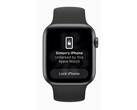The President Biden administration's initiative to provide free high-protection N95 face masks to the American people is commendable given that they are proven to be superior in filtering out COVID-19 virus droplets to cloth or regular surgical masks. The main threat to the success of the White House's public health undertaking is people not wearing the free masks correctly which may be more dangerous than not wearing them at all since they'll have a false sense of security and may take more risks to go to crowded places. Enter FaceBit, a tiny sensor co-developed by Josiah Hester, a computer engineer at Northwestern University’s McCormick School of Engineering that can make any off-the-shelf mask a smart one.
The aptly named FaceBit (as in FitBit for your face) clip-on device is the size of a coin battery, and has several sensors to monitor your mask-wearing skills. The pressure sensor reports the tightness of the fit and the wear duration, telling FaceBit to power down and preserve energy when your mask is off your face. The pressure sensor concept, however, works best with masks that are meant for a tighter fit, like the free KN95 ones that the government is distributing. An accelerometer detects the tiny face skin movements resulting from each heartbeat to measure your pulse rate, while your breathing rate is picked up by a small temperature sensor, says the FaceBit research paper:
It monitors heart rate without skin contact via ballistocardiography, respiration rate via temperature changes, and mask-fit and wear time from pressure signals, all on-device with an energy-efficient runtime system. FaceBit can harvest energy from breathing, motion, or sunlight to supplement its tiny primary cell battery that alone delivers a battery lifetime of 11 days or more.
The FaceBit researchers seem to know that they have to have a phone app if they want device adoption and deliver with one that scores your mask-wearing skills and notifies you about abnormal events. The combined input from all the FaceBit's sensors is transmitted via Bluetooth for your phone to crunch and the accompanying app can warn you if you are wearing your mask for too long, or if you have fidgeted with it and it doesn't apply as well to your face as it initially did.
These warnings could be a boon for healthcare workers, too, who rarely have time to think about their mask fit in a busy COVID ward, for example. The FaceBit developers have open-sourced the platform for faster addition of new features and will be distributing the coin-sized sensor for testing and feedback in real-world scenarios. It will certainly be a more accessible introduction to smart masks than US$100 contraptions like the Razer Zephyr, for instance.















